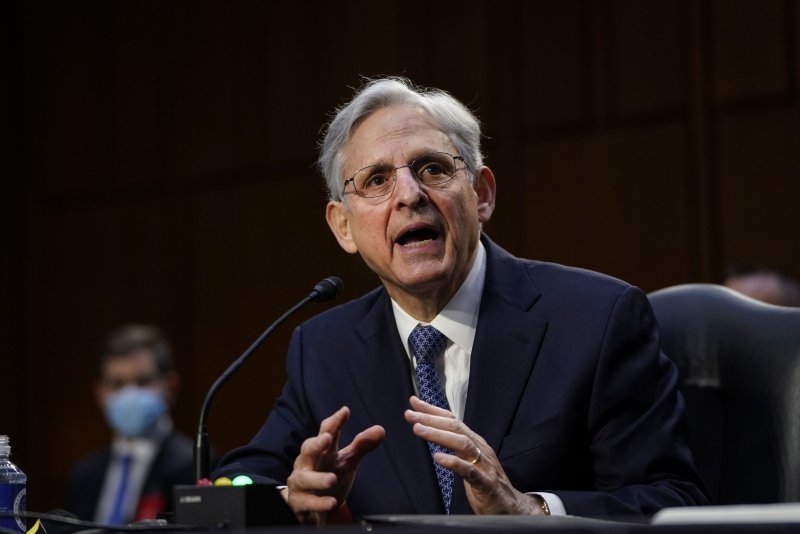U.S. attorney general nominee Merrick Garland testifies on February 22 before the Senate judiciary committee during his confirmation hearing in the Hart Senate Office Building on Capitol Hill in Washington, D.C. Photo by Drew Angerer/UPI/Pool |
License Photo
March 1 (UPI) -- The Senate judiciary committee on Monday approved President Joe Biden's nomination of appellate court judge Merrick Garland to be the United States' chief law enforcement official, sending the appointment on to the full Senate for final confirmation.
The committee voted 15-7 early Monday afternoon to advance Garland's candidacy. Next, the Democratic-held Senate will hold a floor vote, likely this week, in the final step and is expected to approve the nomination. If confirmed, Garland will be sworn in immediately.
Garland, nominated to the post of U.S. attorney general almost two months ago, appeared before the committee for a confirmation hearing last week and signaled his planned approach to the job.
He said that, if confirmed, his top early priority would be overseeing the prosecution of rioters involved in the attack on the U.S. Capitol building on Jan. 6. He also signaled that federal prosecution will not be limited only to those who physically participated in the assault.
"I will supervise the prosecution of white supremacists and others who stormed the Capitol on Jan. 6 -- a heinous attack that sought to disrupt a cornerstone of our democracy: the peaceful transfer of power to a newly elected government," he told the panel.
"We will pursue these leads, wherever they take us."
Garland also said other Justice Department priorities under his leadership will be addressing racial and social inequalities and an upswing of violent crimes in large U.S. cities. He also promised that the department will not be politicized like it was under former President Donald Trump, who was repeatedly accused of using the top-level government institution as his personal legal apparatus.
At his confirmation, Garland also said his Justice Department would be open to new federal-level gun control measures, so long as they are consistent with the law.
Since 1997, when he was appointed by former President Bill Clinton, Garland has been a judge on the U.S. Court of Appeals for the District of Columbia Circuit. He was the court's chief judge between 2013 and last year when his seven-year term ended.
Garland, 68, first rose to prominence as a potential Supreme Court nominee in 2009 and 2010 for vacancies that ultimately went to Sonia Sotomayor and Elena Kagan, respectively. He surfaced again in early 2016 when he was officially nominated by former President Barack Obama to replace late Justice Antonin Scalia.
Senate Republicans, however, denied Garland a vote and argued then that whoever won that November's presidential election should choose Scalia's replacement -- a position they abandoned last September when the death of Justice Ruth Bader Ginsburg brought about the same scenario.
Marcia Fudge
Housing and Urban Development Secretary. White House Press Secretary Jen Psaki (L) looks on as Secretary of Housing and Urban Development Fudge, the first Black woman to lead the department in decades, speaks at a news conference in the James Brady Press Briefing Room of the White House. Photo by Michael Reynolds/UPI |
License Photo
















